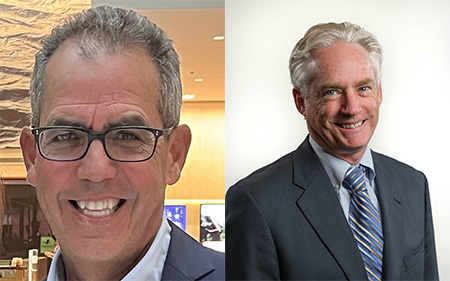
Two longtime physicians from Kalamazoo who serve as clinical assistant professors in the Department of Anesthesiology at WMed have recently taken on important leadership roles at the state and federal level to advocate for their fellow physicians and the patients they serve.
Michael D. Chafty, MD, JD, was recently appointed to an eight-year term on the American Medical Association’s Council on Legislation. His term officially began in June. Meanwhile, Thomas George, MD, a former state representative and senator, was named interim CEO of the Michigan State Medical Society (MSMS) in November.
Both Dr. Chafty and Dr. George said their respective positions within the AMA and MSMS position them to be champions for the physician workforce, public health, and quality patient care, and their stepping into the new roles comes at a critical time as the state and nation recover from the COVID-19 pandemic, there’s an ongoing physician shortage, and those working in the medical field are faced with burnout.
“This whole run has been a great privilege,” Dr. Chafty said. “I tell students, you can go as far as you want, you can be as involved as you want, but don’t underestimate your ability to give and your ability to control your own destiny.”
Dr. Chafty is a longtime member of the AMA and the Michigan Board of Medicine and from 2020 to 2023, he served as chair of the Board of Medicine. Prior to those leadership roles, he was appointed in 2005 by then-Gov. Jennifer Granholm to serve on the state’s opioid commission.
As a member of the AMA’s Council on Legislation, Dr. Chafty said he is joining a leadership body focused on all legislative matters at the federal level that directly impact physicians, patients, and the delivery of care.
As he looks ahead, Dr. Chafty said there are several key issues the Council on Legislation will likely tackle, including Medicare reimbursement, physician burnout, maternal health care, women’s autonomy, and student debt.
“If you’re not at the table then no one is being represented,” Dr. Chafty said. “You have to step up and say I’m representing the patient, I’m representing my ability to deliver quality health care, and these are issues that are critically important to us.”
In selecting Dr. George as its CEO in November, MSMS became one of just two medical societies in the U.S. that boasts a physician at its helm. Previously, Dr. George worked closely with MSMS when he was a member of the state senate’s health policy committee. He has been a member of MSMS since entering practice in Kalamazoo in 1985, and he became a member of the MSMS Board of Directors in 2020.
“I want to prepare MSMS for the future,” said Dr. George, who formerly served as co-chair of the Department of Anesthesiology at WMed. “Our most important job is advocacy for physicians within our state government. States regulate the vast majority of our health care system so state medical societies play a vital role in promoting and advocating for physicians so the physician-patient relationship can continue to be an important part of people’s lives and promoting their health.”
Dr. George said he doesn’t know, at this point, whether his role with the MSMS, which boasts 15,000 members, will become permanent. But, in the meantime, he said the state medical society is focusing its advocacy efforts around topics such as state regulation of the scope of practice and also keeping a close eye on the state’s medical liability system.
“When I was first practicing here in Kalamazoo in 1985, the state’s liability system was in crisis and liability insurance was nearly unaffordable for physicians,” Dr. George said. “So, MSMS worked hard then to put protections in place that are still in place today and that led to liability insurance being much more affordable.”
More recently, Dr. George said he was proud of the work the MSMS government affairs office played in helping Gov. Gretchen Whitmer put together gun safety legislation that was recently signed into law in Lansing.
As they continue in their leadership roles with the AMA and MSMS, Dr. Chafty and Dr. George said they are hopeful that their work will inspire younger physicians and aspiring physicians – residents and medical students alike – to step up in the same manner as they begin their work as doctors.
“Health care doesn’t stop at the walls of the hospital,” Dr. Chafty said. “You have to continually advocate on behalf of your patients and the delivery of medicine. If I want to be better able to deliver good health care, I have to be willing to fight for it beyond my daily shift and my daily existence, and showing up is the only way you’re going to effect change.”
